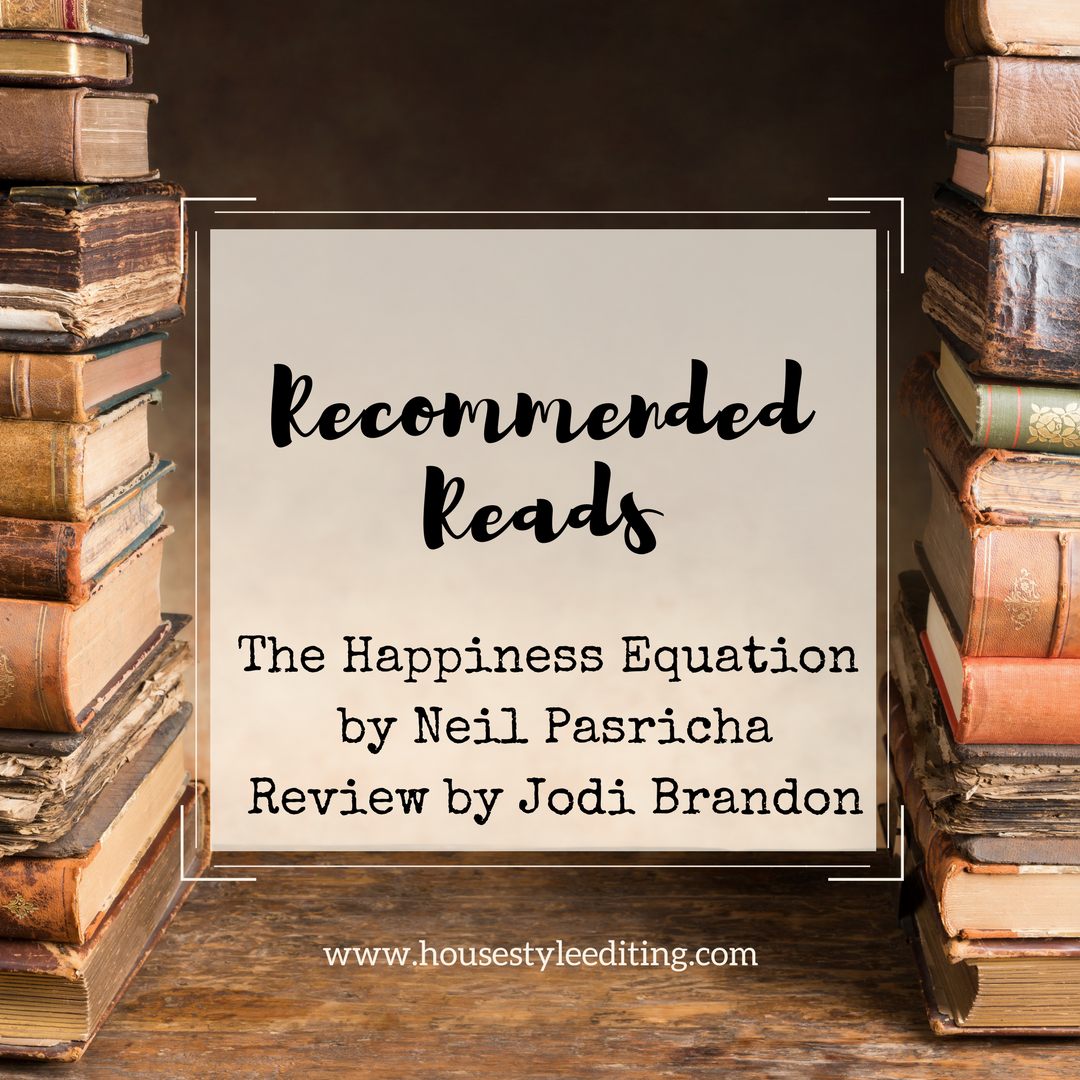There are so many personal improvement and business books out there, right? And how do you know which one is worth reading? Reading reviews, maybe? How about reading a review from an experienced editor? Well, you’re in luck! On this edition of the House Style Editing Blog, we are featuring an exclusive book review of Neil Pasricha’s The Happiness Equation by the lovely and talented Jodi Brandon, editor and publishing consultant extraordinaire at Jodi Brandon Editorial. Jodi and I have read the book and swapped reviews to feature on our respective blogs. Jodi is honest, insightful and thoughtful as she considers the book discussion questions. Let’s dig in!
- Neil Pasricha suggests that our model for happiness is broken—that in order to be happy, we must first be happy. This idea seems controversial, counterintuitive even. Before reading The Happiness Equation, what was your model for happiness? Has your view of happiness changed after reading this book? How so?
To be honest, I don’t know that I thought much about happiness as anything other than reactionary — as something that happens BECAUSE of something or TO someone. I’m a fairly happy person generally, and my feeling is that bad things and good things happen to everyone (personally, professionally, etc.). Pasricha’s model, in which happiness “comes first” makes good sense to me, though: Be happy, then do great work, then achieve success. I do believe that success begets success, so why couldn’t the same be true of happiness?
Pasricha discusses how our brains are trained to look for a problem, find a problem, and improve a problem. I agree with this as well as his (and others’) idea that so much of life is our reaction (90%) to our circumstances/what happens to us (10%). I have found this to be true. Obviously, this is MUCH easier said than done, and a lesson I continue to learn the hard way, but worrying about things we cannot control can suck happiness and joy right out of you.
- Pasricha advises that one of the best ways to get the most out of this book is to give yourself a seven-day challenge. Which of the “Big 7” ways to be happier right now are you most drawn to? How could you incorporate it into your daily routine?
I LOVE this idea! I already do a few of his “Big 7” (quiet time/meditation, walking, unplugging), and I do some random acts of kindness (RAKs). His challenge is five RAKs per week, and I’ll gladly take that challenge. These can be small things (buying coffee for the person behind you in line or writing a note) or larger (cooking and delivering a meal to someone, shoveling a neighbor’s driveway). Right now, I think of RAKs as something I do weekly, but doing something daily would be even better.
I also love the premise of this: that we can learn to be happy. The best part of this habit-building, in my mind, is that while learning to be happy yourself, you’re also bringing happiness to others. Win-win.
- What are some things you hide from others or apologize for? How can you begin to accept those things and remove yourself from possible judgment?
I loved that Pasricha referred to masking and apologizing as forms of self-judgment. It’s so true! Additionally, I find the line between arrogance and confidence comes into play here. We try (we meaning people in general, but particularly women) so hard to not be arrogant or cocky, often because we want to be liked, that sometimes we downplay (or mask) our successes. It’s a struggle for me to not apologize in general — though it’s something I’m working on — when I can’t commit to an event, or a favor, or whatever. Once I became conscious of how often I began a “no” with an apology (“I’m so sorry, but I’m not able to serve on that committee”), I began to work on reframing. It’s a work in progress for sure!
- How has our Culture of More led to discontentment in your life? What steps can you take to adopt a Culture of Enough? What are some ways you’ve already won the lottery?
Why is it that it takes something bad happening (to us, to others, in the world) for us to realize that maybe things aren’t so bad? Three years ago, my family went through a period of about 15 months during which three of my uncles died, all unexpectedly. They were not old. Only one was sick. So, I try to remember every day that I’ve won the lottery in that, though my mom has health issues, both of my parents are here. I have many cousins who cannot say the same. I have a comfortable home, a husband who loves me, and a job I love. I know many people who long to live in a house rather than an apartment, who aren’t in happy and fulfilling relationships, and who don’t love to go to work each day. Why should I get greedy?
I realize that not everyone shares this view, by the way, and that the comparison trap is a real thing. I’m lucky, I think, in that there’s really not much I want or need to be happy. And don’t get me wrong: I’d love to travel more, and have my West Coast family live here on the East Coast, and not need reading glasses, but in the scheme of things, those are such little things. I travel more than many are able to, I Skype with my nephews every single weekday while they eat breakfast, and well, the reading glasses are what they are.
- What decisions can you cut out of your day to be more efficient? What are some access points to your brain that you can close in order to create space?
This section was SO enlightening. The bottom line here makes perfect sense: fewer choices means faster decisions and no decision fatigue. It would have never occurred to me to track all of my decisions in a day to see where I was wasting time. I do obvious things like have social media notifications turned off on my phone and desktop and meal prep on Sundays to create smoother weekday meals, but to see the sheer magnitude of decision-making that goes on in a day blew my mind a bit. 280+ decisions — almost half which revolved around good, the gym, and email?! Yikes.
My husband is a big believer in removing options to be more efficient. He owns several white dress shirts and wears one every day. That way, he says, he can grab any tie and any suit out of the closet, get dressed quickly, and be on his way. So, he does just what Pasricha suggests to create space: remove choice, remove time, and remove access.
I’m certainly not about to track all of my decisions for a day or two and see where I can remove choices, but I will think more consciously about this because — let’s face it — we could use a little more space in our jam-packed lives, right? The things I do now that create space generally relate to time in my mind, but they really are about choice/options as well.
- Pasricha concedes that you will not agree with all nine secrets in this book. He even tells you to expect to disagree. Were there any principles that you initially disagreed with? Why? Did your perspective change over the course of the book? How so?
There were two for me: # 4 (Never retire) and #9 (Don’t take advice). My perspective didn’t change, per se, by reading the book. I see his point, but I don’t agree.
As long as you still have a purpose and things to look forward to — the ikigai that Pasricha talks about — I think retirement is A-okay. You’ll still have passions and a reason to wake up in the morning; they just won’t be career-related. (I see his point in that there are people who define themselves so strongly by their work that they’re lost, in a sense, when they retire.)
As for advice, I so agree with the idea that too many voices can be detrimental to decision-making and can cause analysis paralysis. That said, I see nothing wrong with seeking the opinion of, say, a spouse or a select group of trusted advisors when wrestling with a decision. I absolutely see a place for advice (and even differing opinions).
About Jodi:
Jodi Brandon has more than 20 years’ experience in book publishing. After many years working in traditional publishing, Jodi and her husband relocated from New York to Philadelphia and she launched her freelance editing business. Jodi’s passion these days is working as a book editor and writing/publishing coach for creative entrepreneurs and solopreneurs who want to level up their business with a book. http://www.jodibrandoneditorial.com/



Leave a Reply